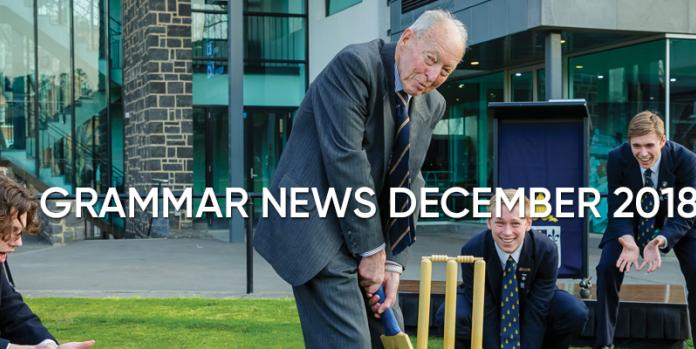'What is a man,
If his chief good and market of his time
Be but to sleep and feed? a beast, no more.
Sure, he that made us with such large discourse, Looking before and after, gave us not
That capability and God-like reason
To fust in us unused.’
Hamlet
Though ‘What is a man?’ may be a lofty epistemological question, I’d like to bring it down to earth and playfully make sport of it. Whether engaged in combat on the ovals, fields or courts, Melbourne Grammar School sport has always been about development of the person, the sharpening of motor and thinking skills, the concept of teamwork and the spirit of competition.
As philosopher Raimond Gaita has taught us, there is a difference between the core of what we call the human being and the taxonomy of the order of primates in the species known as homo sapiens. Surely Melbourne Grammar sport is more concerned with the being in performance than the performance of the being.
Nevertheless, this is an age where performance in sport is increasingly reliant on the new science of ‘analytics’. This is a time where the regimen of elite sportsmen and sportswomen influence the blueprint of training at the lower levels. We live with a technology of measurement, where in the moment readings are a mere wrist band away. With the new age at our feet, why do we still care about the heady ideas of camaraderie, sportsmanship and cooperation, the very abstract notions beyond statistical measures and Fitbits? Of course, our preparation for competition is important. Performance is important. Playing the game to win is important. But we need to distinguish what’s fit from what’s fitting. I do not write about sport to deny measurement; I write about sport to affirm character.
We do know that sport was originally an amateur pursuit. The Latin root of amateur points us to an activity undertaken for the love of the doing, for pleasure and not for profit. It is an “aficion” as the Spanish say, a passion in this case for the field of engagement. The incentive to play is within us before it is ever within our world. Perhaps it is time to dust off the dust cover so that our students may see Melbourne Grammar’s working title more clearly: Sport as Play. Surely, every teacher wants a student to read.
May I read a little more in Sport as Play? After all, it is not odd for an English teacher to see such an act of playing as linked to performance, to see sport as theatre, quarters as scenes, and coaches as directors. Even the word ‘players’ resounds in both worlds: action occurs on a stage, generally before an audience, and with the general truth that plays must be learned to perform well.
There is complicity in any act of reading; the author goes through the text to reach the reader. Without the text, there can be no such union. At Melbourne Grammar, we have a living, active and breathing text that we reach as coach and tutor and teacher. With such a full reading of that text, our school’s field of vision expands. In this sense, our boys’ participation in the various levels of sport played at the School develops character and in Hamlet’s words ‘large discourse’ in the text we all love to read.
Stephen Dessants
Teacher in Charge of Tennis and Head of English
Related topics
